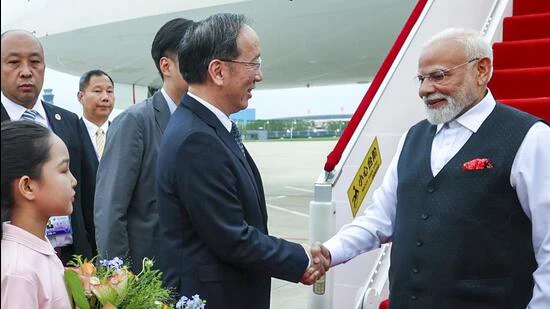PM Modi reaches China for first visit in 7 years, to meet Xi and Putin, attend SCO Summit

New Delhi: Prime Minister Narendra Modi arrived in China on Saturday for his first visit in seven years, during which he will hold meetings with Chinese President Xi Jinping and Russian President Vladimir Putin, and participate in the Shanghai Cooperation Organisation (SCO) Summit.
The visit, also the first by the PM since India and China became embroiled in a military standoff on the Line of Actual Control (LAC) in April-May 2020, has taken on greater significance due to the sudden souring of India-US relations over President Donald Trump’s decision to double tariffs on Indian goods, including a 25% punitive levy on purchases of Russian oil.
Modi flew to the Chinese city of Tianjin, the venue of the SCO Summit, from Japan, where he and Prime Minister Shigeru Ishiba unveiled several initiatives to ramp up economic cooperation. This includes a target of Japanese private investments amounting to $68 billion over a decade, and an Economic Security Initiative, amid the uncertainty created by US trade policies.
Soon after landing in Tianjin, Modi posted on social media: “Looking forward to deliberations at the SCO Summit and meeting various world leaders.” External affairs ministry spokesperson Randhir Jaiswal said Modi’s visit is a “testament to our constructive and proactive role in SCO.”
Modi and Xi, who last met two days after India and China reached an understanding on ending the face-off at the border in October, will hold talks on Sunday afternoon. Further measures to normalise India-China ties, including active management of the border to ensure peace, and preserving the global economic order amid the turbulence created by US trade policies, are expected to feature in the meeting, people familiar with the matter said on condition of anonymity.
This meeting is a follow-up to Chinese foreign minister Wang Yi’s visit to India this month, when the two sides agreed on several initiatives, including an “early harvest” in delimiting the disputed border, early resumption of direct flights, and promoting trade and investment flows, the people said.
In the context of the border, the situation has been “broadly stable,” with both sides recognising the need to maintain peace on the LAC through active management measures. The two sides are now expected to discuss ways to build on the progress made since last year, the sources added.
While the two sides have agreed on the resumption of direct flights, this is still linked to an updated air services agreement, which is now in the final stages of negotiation, the sources said.
However, the bilateral engagements in Tianjin should not be seen as a pivot away from the US towards China and Russia, the sources clarified. There are also no plans for any discussions at any level under the Russia-India-China (RIC) mechanism, they said.
Besides his bilateral meeting with Xi, Modi will join other SCO leaders for an official reception on Sunday evening that could bring him face-to-face with Pakistan Prime Minister Shehbaz Sharif, who is also in Tianjin. This would be their first interaction since the hostilities between the two countries in May, following India’s Operation Sindoor, which targeted terrorist infrastructure in Pakistan.
On Monday, Modi will participate in the SCO Summit and subsequently hold a bilateral meeting with Putin. Bolstering India-Russia cooperation in trade and defence, the US pressure on India over Russian oil purchases, and Putin’s planned visit to India for an annual summit are expected to figure in the meeting. Kremlin aide Yury Ushakov said on Friday that preparations for Putin’s planned visit to India in December would be discussed when he meets Modi.
Indian officials have said they expect the SCO Summit to strongly condemn cross-border terrorism, in keeping with the founding principles of the bloc. SCO was formed by China, Russia, and several Central Asian states in 2001, with the stated aim of countering terrorism, separatism, and extremism. While the bloc’s charter doesn’t allow the raising of bilateral issues, India has pushed for condemnation of cross-border terrorism in joint statements and documents adopted by the 10-member bloc.
“As far as the declaration at this summit is concerned, that is under finalisation… We are working with other members and partners to ensure that there is a strong reiteration of the condemnation of terrorism, including cross-border terrorism,” Tanmaya Lal, secretary (West) in the external affairs ministry, said this week.